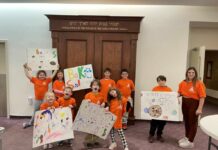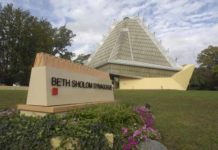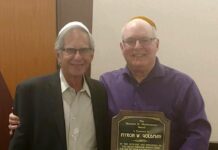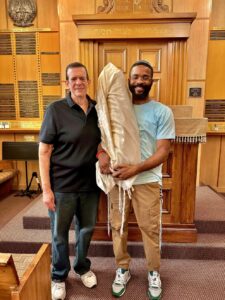
Sasha Rogelberg
About 5,420 miles separates Philadelphia and Abuja, Nigeria’s capital city.
And Beth Sholom Congregation’s Moshe Hezekiah has worked to bridge that distance.
In July, Hezekiah, the baal koreh, or Torah reader, at the Elkins Park synagogue facilitated the donation of a Torah scroll from Beth Sholom to the Jewish community in Abuja, where Hezekiah grew up. He traveled to his hometown and celebrated the arrival of the Torah with a community Shabbat service at Tikvat Israel, his hometown synagogue.
“They were very excited,” Hezekiah said of the congregation. “And we had lots [more] members than usual come for the services that morning.”
The Torah has remained fundamental to the community. Last month, Tikvat Israel celebrated the community’s first bar mitzvah with the Torah.
The donated Torah came from Beth Sholom’s small collection of scrolls accumulated after several mergers over the decades. Beth Sholom Rabbi David Glanzberg-Krainin invited sofer (scribe) and Beth Midrash HaRav B’Nai Jacob Rabbi Isaac Liezerowski to inspect and kosher the selected Torah, making sure each letter was legible. Glanzberg-Krainin presented Hezekiah with the Torah before Hezekiah’s trip.
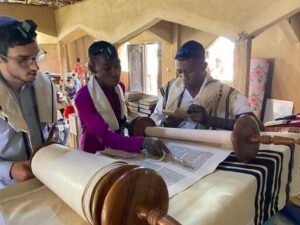
“It was a very lovely, lovely thing, both for our congregants and Beth Sholom, as well as feeling that we are helping to bring Torah to a part of the world where there just so few Torah scrolls and such a hunger, it feels like, to learn about Jewish life and to be able to celebrate Jewish Life,” Glanzberg-Krainin said.
Traveling overseas with the sacred scroll was challenging. At first, Hezekiah negotiated with the airlines to get a separate seat for the Torah. Airline policy allows for an extra seat for a musical instrument, but when officials saw Hezekiah with the Torah at the airport, they were confused.
Hezekiah tried to justify the carry-on, saying that “a sefer Torah is used for musical purposes sometimes,” but was told to check the scrolls. He kept an AirTag on the Torah to ensure it did not get lost in the trip from Philadelphia to Frankfurt, Germany to London to Abuja.
“It was a very difficult thing for me to do,” Hezekiah said. “But at the end of the day, it was essential.”
Nigeria’s practicing Jewish population is small — about 3,000 of Nigeria’s 213 million total population — and resources among the community are scarce. Hezekiah said the 20 synagogue communities in the country share only one Torah, thanks to a community fundraiser. Kulano, a nonprofit supporting global emerging Jewish communities, funded the Torah’s repair.
Toratot are expensive, Hezekiah said, and the community values the second Torah because of both its monetary and spiritual worth.
“It’s just very difficult to get one, and when we do get one, it’s a very special thing for us; it’s a special object for us,” he said. “We pay so much respect to it. We give all that we have to ensure it’s safe, it’s in a great position, taken care of properly.”
Since moving to Philadelphia last summer, Hezekiah has flown back and forth from Abuja to provide resources and opportunities to the Jewish community there. Hezekiah, along with World Bank Group Leading Governance Specialist Debbie Isser, created Camp Sarah, a summer camp for Nigerian Jewish children aged 5-16. Tikvat Israel hosted the camp’s inaugural session in August with 42 campers.
Many of the Jewish children in Abuja are the only Jews in their school classes, Isser said. In addition to providing Jewish education to Abuja’s Jewish youth, Camp Sarah, named for Isser’s mother, was a way to build connections among the community’s children.
“When I think about camp and what I heard people saying afterwards, I realized, it was so much just [to] create a safe space where I don’t have to explain who I am and what I do and why I do these things,” she said.
Hezekiah has brought parts of his home country back to Philadelphia, too.
In addition to chanting Torah at Beth Sholom with unique tropes that incorporate the Igbo language, Hezekiah has introduced Nigerian melodies to the Elkins Park congregation. Beth Sholom Cantor Jacob Agar arranged the melodies for the synagogue’s band to play during Kabbalat Shabbat services.
“There are just these many, many deepening ways that we’ve benefited from Moshe’s presence and expanded our own sense of what klah Yisrael is, what the Jewish people is, by bringing some of that beauty to our congregation as well,” Glanzberg-Krainin said.
Sasha Rogelberg is a Philadelphia-based freelance writer.



